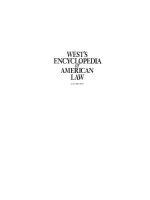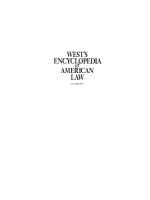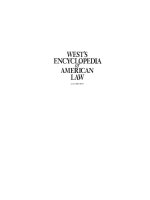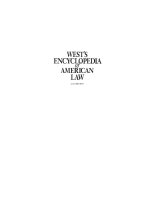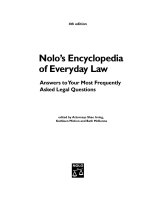encyclopedia of everyday law 8th (2011)
Bạn đang xem bản rút gọn của tài liệu. Xem và tải ngay bản đầy đủ của tài liệu tại đây (4.09 MB, 514 trang )
“ Practical examples, explanations of legal
principles, and useful tips ”
LIBRARY JOURNAL
N O L O
8th Edition
OVER
50,000
IN PRINT
50,000 50,000
IN PRINTIN PRINT
Nolo’s
Encyclopedia
of
Everyday
Law
Shae Irving, J.D. & the editors of Nolo
Answers to Your
Most Frequently Asked
Legal Questions
Free Legal Updates at Nolo.com
®
e Story
Dear friends,
Founded in 1971, and based in an old clock factory in
Berkeley, California, Nolo has always strived to off er clear
legal information and solutions. Today we are proud to
off er a full range of plain-English law books, legal forms,
software and an award-winning website.
Everything we publish is relentlessly researched and
tested by a dedicated group of in-house legal editors,
who together have more than 150 years’ experience. And
when legal changes occur after publication, we promptly
post free updates at Nolo.com.
Tens of millions of Americans have looked to Nolo to
help solve their legal and business problems. We work
every day to be worthy of this trust.
Ralph Warner
Nolo co-founder
Emma Cofod
Books & Software
Get in-depth information. Nolo publishes hundreds of great books
and software programs for consumers and business owners. ey’re all
available in print or as downloads at Nolo.com.
Legal Encyclopedia
Free at Nolo.com. Here are more than 1,400 free articles and answers to
common questions about everyday legal issues including wills, bankruptcy,
small business formation, divorce, patents, employment and much more.
Plain-English Legal Dictionary
Free at Nolo.com. Stumped by jargon? Look it up in America’s most
up-to-date source for defi nitions of legal terms.
Online Legal Documents
Create documents at your computer. Go online to make a will or living
trust, form an LLC or corporation or obtain a trademark or provisional
patent at Nolo.com. For simpler matters, download one of our hundreds
of high-quality legal forms, including bills of sale, promissory notes,
nondisclosure agreements and many more.
Lawyer Directory
Find an attorney at Nolo.com. Nolo’s unique lawyer directory provides
in-depth profi les of lawyers all over America. From fees and experience
to legal philosophy, education and special expertise, you’ll fi nd all the
information you need to pick a lawyer who’s a good fi t.
Free Legal Updates
Keep up to date. Check for free updates at Nolo.com. Under “Products,”
fi nd this book and click “Legal Updates.” You can also sign up for our free
e-newsletters at Nolo.com/newsletters/index.html.
Products
&
Services
“ In Nolo you can trust.”
THE NEW YORK TIMES
“ Nolo is always there in a jam as the nation’s premier publisher
of do-it-yourself legal books.”
NEWSWEEK
“ Nolo publications…guide people simply through the how,
when, where and why of the law.”
THE WASHINGTON POST
“ [Nolo’s]…material is developed by experienced attorneys who
have a knack for making complicated material accessible.”
LIBRARY JOURNAL
“ When it comes to self-help legal stuff , nobody does a better job
than Nolo…”
USA TODAY
“ e most prominent U.S. publisher of self-help legal aids.”
TIME MAGAZINE
“ Nolo is a pioneer in both consumer and business self-help
books and software.”
LOS ANGELES TIMES
e Trusted Name
(but don’t take our word for it)
8th Edition
Nolo’s Encyclopedia
of Everyday Law
Answers to Your
Most Frequently Asked
Legal Questions
by Shae Irving, J.D. & Nolo editors
EIGHTH EDITION JANUARY 2011
Editor EMILY DOSKOW
Cover design SUSAN PUTNEY
Book design TERRI HEARSH
Proofreader CATHERINE CAPUTO
Index SONGBIRD INDEXING
Printer DELTA PRINTING SOLUTIONS, INC.
Nolo’s encyclopedia of everyday law : answers to your most frequently asked legal
questions / by Shae Irving & Nolo editors. 8th ed.
p. cm.
Includes index.
ISBN-13: 978-1-4133-1321-5 (pbk.)
ISBN-10: 1-4133-1321-3 (pbk.)
ISBN-13: 978-1-4133-1347-5 (e-book)
ISBN-10: 1-4133-1347-7 (e-book)
1. Law United States Popular works. 2. Law United States Miscellanea. I. Irving,
Shae. II. Nolo (Firm) III. Title: Encyclopedia of everyday law.
KF387.N65 2010
349.73 dc22
2010031328
Copyright © 1996, 1999, 2002, 2003, 2005, 2008, and 2011 by Nolo.
All rights reserved. The NOLO trademark is registered in the U.S.
Patent and Trademark Offi ce. Printed in the U.S.A.
No part of this publication may be reproduced, stored in a retrieval system, or
transmitted in any form or by any means, electronic, mechanical, photocopying,
recording, or otherwise without prior written permission. Reproduction prohibitions do
not apply to the forms contained in this product when reproduced for personal use. For
information on bulk purchases or corporate premium sales, please contact the Special
Sales Department. Call 800-955-4775 or write to Nolo, 950 Parker Street, Berkeley,
California 94710.
Please note
We believe accurate, plain-English legal information should help you solve many of
your own legal problems. But this text is not a substitute for personalized advice
from a knowledgeable lawyer. If you want the help of a trained professional—and
we’ll always point out situations in which we think that’s a good idea—consult an
attorney licensed to practice in your state.
Dedication
For Edward F. Dolan
Acknowledgments
Thanks to Jake Warner for inspiring and
supporting this project. And thanks to
all the Nolo editors and hardworking
production folks who keep the book on
track.
We’re also grateful to every Nolo author
whose fine work has shaped these
pages. You’ll find many of these talented
individuals listed in the Contributors section
on the following page. But we want to give
special thanks to:
Paul Bergman and Sara Berman-Barrett,
authors of Represent Yourself in Court and
The Criminal Law Handbook
David W. Brown, author of Beat Your Ticket:
Go to Court & Win!
Denis Clifford, author of many Nolo titles,
including The Quick & Legal Will Book,
Nolo’s Simple Will Book, and Make Your
Own Living Trust, and coauthor of Plan
Your Estate and A Legal Guide for Lesbian
& Gay Couples
Frederick W. Daily, author of Stand Up to the
IRS and Tax Savvy for Small Business.
Stephen R. Elias, author of numerous Nolo
books, including The New Bankruptcy: Will
It Work for You?, Special Needs Trusts: Protect
Your Child’s Financial Future, How to File for
Chapter 7 Bankruptcy, and Legal Research:
How to Find & Understand the Law
Cora Jordan, author of Neighbor Law: Fences,
Trees, Boundaries & Noise and coauthor
(with Denis Clifford) of Plan Your Estate
Mimi Lyster Zemmelman, author of Building
a Parenting Agreement That Works: Child
Custody Agreements Step by Step.
Anthony Mancuso, author of Incorporate
Your Business, How to Form a Nonprofit
Corporation (national and California
editions), Form Your Own Limited
Liability Company, The Corporate Records
Handbook, and LLC or Corporation?
Joseph Matthews, author of How to Win Your
Personal Injury Claim and Long-Term Care:
How to Plan & Pay for It, and coauthor
(with Dorothy Matthews Berman) of Social
Security, Medicare & Government Pensions
Fred S. Steingold, author of The Legal Guide
for Starting & Running a Small Business and
The Employer’s Legal Handbook
Contributors
Ilona Bray Ilona’s legal background includes
solo practice as well as experience in
the nonprofit and corporate worlds. She
has written or coauthored several Nolo
titles, including Effective Fundraising for
Nonprofits, Becoming a U.S. Citizen, and
Nolo’s Essential Guide to Buying Your First
Home.
Catherine Caputo Before joining Nolo, Cathy
was an attorney in private practice assisting
start-up and small business clients with a
wide range of legal needs. She edits small
business books and software and also
focuses on issues affecting seniors, such
as Social Security benefits and retirement.
Cathy received her law degree, with honors,
from the University of San Francisco School
of Law.
Amy DelPo Amy has been an editor at
Nolo since January 2000. She specializes
in workers’ rights, sexual harassment law,
employment law, criminal law, and civil
litigation. She brings more than six years of
criminal and civil litigation experience to her
work at Nolo, having litigated cases in all
levels of state and federal courts, including
the California Supreme Court and the United
States Supreme Court. Amy received her law
degree, with honors, from the University of
North Carolina at Chapel Hill.
Emily Doskow Emily is a Nolo author and
editor, and a mediator and attorney in
private practice in Berkeley, California,
specializing in adoption and family law,
especially for same-sex couples. She is the
coauthor of several Nolo books, including
Nolo’s Essential Guide to Divorce, The
Sharing Solution, A Legal Guide for Lesbian
& Gay Couples, and How to Change Your
Name in California.
Diana Fitzpatrick Diana worked on municipal
finance issues at the San Francisco City
Attorney’s office before joining Nolo. She
also worked at a law firm in New York for
several years before moving to the Bay Area.
Diana is a graduate of New York University
School of Law and Barnard College.
Lisa Guerin During her years as a law
student at Boalt Hall School of Law at
the University of California at Berkeley,
Lisa worked for Nolo as a research and
editorial assistant. After a stint as a staff
attorney at the U.S. Court of Appeals for
the Ninth Circuit, Lisa has worked primarily
in the field of employment law, in both
government and private practice. Lisa
rejoined Nolo in 2000 and is the coauthor
of several employment titles, including
Create Your Own Employee Handbook and
Dealing With Problem Employees.
Shae Irving Shae graduated from Boalt Hall
School of Law at the University of California
at Berkeley in 1993 and began working for
Nolo in 1994. She has written extensively
on durable powers of attorney, health
care directives, and other estate planning
issues. She is the managing editor for Nolo’s
Quicken WillMaker Plus software.
Bethany K. Laurence Beth graduated
from Hastings College of the Law at the
University of California in 1993. She spent
several years working for a corporate legal
publisher before coming to Nolo. She joined
Nolo’s editorial staff in 1997 and has never
been happier. Beth is the coauthor of Nolo’s
Business Buyout Agreements and the editor
of many of Nolo’s small business books.
Janet Portman Janet received under graduate
and graduate degrees from Stanford
University and a law degree from the
University of Santa Clara. She was a public
defender before coming to Nolo. Janet is
Nolo’s managing editor, the author of Every
Landlord’s Guide to Finding Great Tenants,
and the coauthor of many Nolo titles,
including Every Landlord’s Legal Guide, Every
Tenant’s Legal Guide, Renters’ Rights, and
Negotiating the Best Lease for Your Business.
Mary Randolph Mary has been editing
and writing Nolo books and software for
more than a decade. She earned her law
degree from Boalt Hall School of Law at
the University of California at Berkeley, and
her undergraduate degree at the University
of Illinois. She is the author of Deeds for
California Real Estate, The Executor’s Guide,
and other Nolo materials.
Alayna Schroeder Alayna graduated from the
University of California, Hastings College
of the Law, and worked as an employment
attorney before joining Nolo’s staff in 2005.
In addition to editing employment and
real estate titles, she is coauthor of Nolo’s
Essential Guide to Buying Your First Home.
Betsy Simmons-Hannibal Betsy is a Nolo
editor specializing in estate planning books
and software. She graduated with The
Honors Lawyering Program from Golden
Gate University School of Law where she
was research editor of the law review. Prior
to joining Nolo, she trained at two private
law firms as well as the San Francisco
Superior Court and the Federal District
Court of Northern California.
Marcia Stewart Marcia is an expert on
landlord-tenant law, buying and selling
houses, and other issues of interest to
consumers. She is the coauthor of Nolo’s
Every Landlord’s Legal Guide, Every
Tenant’s Legal Guide, Renters’ Rights, and
Leases & Rental Agreements, and editor of
Nolo’s LeaseWriter software for landlords.
Richard Stim Rich graduated from the
University of San Francisco Law School and
worked in private practice for 16 years until
joining Nolo as an editor in 2000. He is the
author of Profit From Your Idea, Getting
Permission, and Music Law, and is the
coauthor of Patent Pending in 24 Hours.
Ralph Warner Ralph is a cofounder of Nolo.
He is the author (or coauthor) of a number
of Nolo books, including Every Landlord’s
Legal Guide, Everybody’s Guide to Small
Claims Court, Form a Partnership, and Get
a Life: You Don’t Need a Million to Retire
Well. Ralph is a lawyer who became fed
up with the legal system and dedicated
his professional life to making law more
accessible and affordable to all Americans.
●
Table of Contents
About is Book 1
1
Houses 3
Buying a House 4
Selling Your House 12
Deeds 17
2
Neighbors 21
Boundaries 22
Fences 23
Trees 25
Views 26
Noise 28
3
Landlords and Tenants 33
Leases and Rental Agreements 34
Tenant Selection 36
Housing Discrimination 36
Rent and Security Deposits 38
Tenants’ Privacy Rights 39
Cable Access and Satellite Dishes 40
Repairs and Maintenance 42
Landlord Liability for Criminal Acts and Activities 45
Landlord Liability for Lead Poisoning 47
Landlord’s Liability for Exposure to Asbestos, Mold, and Bedbugs 48
Insurance 49
Foreclosure 51
Resolving Disputes 51
4
Workplace Rights 57
Fair Pay and Time Off 58
Workplace Health and Safety 67
Workers’ Compensation 70
Discrimination 76
Harassment 87
Workplace Privacy 91
Losing Your Job 94
5
Small Businesses 99
Before You Start 100
Legal Structures for Small Businesses 106
Nonprofit Corporations 113
Small Business Taxes 116
Home-Based Businesses 121
Employers’ Rights & Responsibilities 126
6
Patents 143
Qualifying for a Patent 144
Obtaining a Patent 149
Enforcing a Patent 151
Putting a Patent to Work 153
How Patents Differ From Copyrights and Trademarks 156
7
Copyrights 159
Copyright Basics 160
Copyright Ownership 162
Copyright Protection 165
Copyright Registration and Enforcement 168
8
Trademarks 171
Types of Trademarks 172
Trademark Protection 175
Using and Enforcing a Trademark 178
Conducting a Trademark Search 180
Registering a Trademark 183
How Trademarks Differ From Patents and Copyrights 186
9
Your Money 189
Purchasing Goods and Services 190
Using Credit and Charge Cards 195
Using an ATM or Debit Card 198
Strategies for Repaying Debts 200
Dealing With the IRS 206
Debt Collections 210
Bankruptcy 212
Rebuilding Credit 215
10
Cars and Driving 221
Buying a New Car 222
Leasing a Car 227
Buying a Used Car 229
Financing a Vehicle Purchase 232
Insuring Your Car 233
Your Driver’s License 236
If You’re Stopped by the Police 239
Drunk Driving 240
Traffic Accidents 242
11
Wills and Estate Planning 247
Wills 248
Probate 254
Executors 255
Avoiding Probate 259
Living Trusts 259
Estate and Gift Taxes 263
Funeral Planning and Other Final Arrangements 266
Body and Organ Donations 270
12
Health Care Directives and Powers of Attorney 273
Health Care Directives 274
Durable Powers of Attorney for Finances 280
Conservatorships 284
13
Older Americans 289
Retirement Plans 290
Social Security 294
Medicare 299
Finding a Caregiver or Residential Care Facility 305
14
Spouses and Partners 311
Living Together—Gay or Straight 312
Domestic Partnership and Civil Unions 316
Premarital Agreements 317
Marriage 320
Divorce 324
Domestic Violence 334
Changing Your Name 337
15
Parents and Children 343
Adopting a Child 344
Stepparent Adoptions 355
Adoption Rights: Birth Parents, Grandparents, and Children 357
Child Custody and Visitation 360
Child Support 366
Guardianship of Children 372
16
Courts and Mediation 377
Representing Yourself in Court 378
Small Claims Court 388
Mediation 395
Finding and Working With a Lawyer 400
17
Criminal Law and Procedure 413
Criminal Law and Procedure: An Overview 414
If You Are Questioned by the Police 420
Searches and Seizures 421
Arrests and Interrogations 425
Bail 429
Getting a Lawyer 431
G
Glossary 437
A
Appendix: Legal Research 457
Learning About a Particular Area of the Law 458
Finding a Specific Law 460
Finding Answers to Specific Legal Questions 465
Finding Legal Forms 468
I
Index 471
About is Book
W
hether we like it or not, the law
touches our personal lives in
many ways each day. We may
not think much about the laws that affect
us as we carry out simple tasks such as
driving a car, making a telephone call, or
buying milk at the corner grocery store. But
every now and again, we’re sure to need
an answer to a common legal question that
arises in the course of daily life:
What can I do about my noisy neighbor?
What are my rights if I’m fired from my job?
Do I really need to make a will?
What should I do if I can’t pay the child
support I owe?
And so on.
This book provides answers to frequently
asked questions about more than 100
subjects you might encounter in your
personal life—topics that range from buying
a house to getting a divorce, from paying
your debts to starting and running a small
business. Obviously, we can’t answer every
question on a particular subject, but we’ve
answered many common ones to get you
started. Throughout each chapter, you’ll
find resource boxes listing sources for more
information about a particular subject.
In addition, for those of you who are
computer savvy, each chapter contains a list
of online sites that will help you learn more
about a particular area of the law. Look
for the “Online Help” icon as you read.
And if you need more information about
finding the law, the appendix contains a
section that shows you how to do basic
legal research—with a focus on using the
Internet.
Think of this book as a desk reference—
a little encyclopedia that explains what the
law really means in a language you can
understand. But remember that the law
changes constantly, as legislatures pass new
statutes and courts hand down their rulings.
We will publish new, revised editions of
this book periodically, but it will never be
perfectly current. It’s always your responsi-
bility to be sure a law is up to date before
you rely on it. Check for legal updates on
our website at www.nolo.com for the most
current legal information affecting Nolo
books and software.
●
C H A P T E R
1
Houses
Buying a House 4
Selling Your House 12
Deeds 17
4
|
NOLO’S ENCYCLOPEDIA OF EVERYDAY LAW
Home is heaven for beginners.
—Charles H. Parkhurst
B
uying or selling a house is a both
exciting and demanding. To do it
successfully, you need to understand
how houses are priced, financed, and
inspected; how to find and work with a real
estate agent; how to protect your interests
when negotiating a contract; and how legal
transfer of ownership takes place. This
chapter covers many of the basic topics
that buyers, sellers, and owners need to
understand.
Buying a House
Before you fall in love with a house, it’s
essential to determine how much you can
afford to pay and what your financing
options are. You’ll also need to choose a
good real estate agent or broker, decide
whether to buy an old house, new house, or
condo, and finally, even if you think you’ve
found your dream home, understand house
inspections and insure your new home
against unforeseen problems.
I’m a first-time home buyer. How do I
determine how much house I can afford?
Don’t rely on abstract formulas to determine
how much you can pay. Instead, take a
close look at how much of your monthly
income you can realistically set aside
after you stop paying rent. Then, when
considering a particular house, total up
the estimated monthly loan payments
(including principal and interest) plus one-
twelfth of your yearly bill for property and
homeowners’ insurance and other house-
related costs like utilities and maintenance.
Now compare that to your monthly income.
Lenders expect you to make all monthly
housing payments with 28% to 38% of your
gross monthly income (before taxes). The
exact percentage depends on the amount
of your down payment, the interest rate on
the type of mortgage you want, your credit
score, the level of your long-term debts, and
other factors.
It’s best to run the numbers yourself
before you talk to a bank or lender. Various
online mortgage calculators, such as those
on the websites listed at the end of this
chapter, will help you get a realistic picture
of your budget.
Once you’ve done the basic calculations,
you can ask a lender or loan broker for
a prequalification letter saying that you
are likely to be approved for a loan of a
specified amount based on your income
and credit history.
However, unless you’re in a very slow
market, with lots more sellers than buyers,
you’ll want to do more than prequalify—
you’ll want to be all but guaranteed
for a specific loan amount. This means
that the lender actually evaluates your
financial situation, runs a credit check,
and preapproves you for a loan (subject
to you satisfying any last-minute questions
ChAPter 1|HOUSES|5
or conditions). Having lender preapproval
makes you more financially attractive to
sellers than simple loan prequalification and
is crucial in competitive markets or where
sellers are wary of accepting any offer that
might not close successfully.
How important is my credit history in
getting loan approval?
Your credit history plays a vital role in
determining the type and amount of loan
lenders offer you. When reviewing loan
applications, lenders typically request
your credit score from the credit bureaus.
This score is a statistical summary of the
information in your credit report, including:
•your history of paying bills on time
•the level of your outstanding debts
•how long you’ve had credit
•your credit limit
•the number of inquiries for your credit
report (too many of a certain kind can
lower your score), and
•the types of credit you have.
The higher your credit score, the easier
it will be to get a loan. If your score is
low, a lender may either reject your loan
application altogether or insist on a very
large down payment or high interest rate to
lower the lender’s risk.
To avoid problems, always check your
credit report and clean up your file if
necessary—before, not after, you apply
for a mortgage. For information on how to
order and clean up your credit report, see
Chapter 9.
How can I find the best home loan or
mortgage?
Banks, credit unions, savings and loans,
insurance companies, mortgage bankers,
and others make home loans. Lenders and
terms change frequently as new companies
appear, old ones merge, and market
conditions fluctuate. To get the best deal,
compare loans and fees from at least a half-
dozen lenders. This information is widely
available on the Internet.
Mortgage rate websites come in two basic
flavors: those sites that don’t offer loans
(called “no-loan” sites) and those that do.
No-loan sites are a great place to examine
mortgage programs, learn mortgage lingo,
and crunch numbers with online mortgage
calculators.
Many online mortgage sites also offer
direct access to loans from one or more
lenders. However, many customers report
dissatisfaction with online mortgage services
and prefer to complete their transaction with
a “live” lender or broker.
See the end of this chapter for addresses
of some mortgage websites.
To avoid all the legwork involved in
shopping for mortgages on your own, you
can also work with a loan broker, someone
who specializes in matching house buyers
with an appropriate mortgage lender. Given
the increasing variety of loan types—as
discussed further on in this section—an
experienced broker can also help you decide
which is best for you. (But check the broker’s
qualifications carefully—not all brokers are
licensed.) Loan brokers usually collect their
fee from the lender, not from you.
6
|
NOLO’S ENCYCLOPEDIA OF EVERYDAY LAW
What are my other options for home loans?
You may also be eligible for a government-
guaranteed loan, offered by:
•the Federal Housing Administration
(FHA), an agency of the Department
of Housing and Urban Development
(HUD) (see www.hud.gov)
•the U.S. Department of Veterans Affairs
(see www.homeloans.va.gov), or
•a state or local housing agency.
Government loans usually have low down
payment requirements and sometimes offer
better-than-market interest rates as well.
Also, ask banks and other private lenders
about any “first-time buyer programs” that
offer low down-payment plans and flexible
qualifying guidelines to low- and moderate-
income buyers with good credit.
Finally, don’t forget private sources of
mortgage money—parents, other relatives,
friends, or even the seller of the house you
want to buy. Borrowing money privately is
usually the most cost-efficient method of all.
What’s the difference between a fixed and
an adjustable rate mortgage?
With a fixed rate mortgage, the interest
rate and the amount you pay each month
remain the same over the entire mortgage
term, traditionally 15 or 30 years.
With an adjustable rate mortgage (ARM),
your interest rate will fluctuate in step with
the interest rates in the economy. Initial
interest rates of ARMs are usually offered at
a discounted (“teaser”) rate, which is lower
than those for fixed rate mortgages. Over
time, however, initial discounts are filtered
out. To avoid constant and drastic changes,
ARMs typically regulate (cap) how much
and how often the interest rate and/or
payments can change in a year and over the
life of the loan.
How do I decide between a fixed and an
adjustable rate mortgage?
Because interest rates and mortgage options
change often, your choice of a fixed or an
adjustable rate mortgage should depend
on the interest rates and mortgage options
available when you’re buying, how much
you can afford in the short term, your view
of the future (generally, high inflation will
mean that ARM rates will go up and lower
inflation means that they will fall), and how
willing you are to take a risk.
Risk-averse people usually choose the
certainty of a fixed rate mortgage, even
when balanced against the possibility that
an ARM might be cheaper in the long run.
However, some people can’t afford the
relatively higher interest rates at which fixed
rate mortgages usually begin.
Keep in mind that if you take out a loan
now, and several years from now interest
rates have dropped but your home has
retained its value, refinancing may be an
option. But if the only way you can afford
your home over the long term given your
expected income is to count on a refinance,
don’t take the risk—many others have done
so and lost.
To make sure you can refinance
profitably in the future, avoid prepayment
penalties on your first mortgage.
ChAPter 1|HOUSES|7
What’s the best way to find and work with a
real estate agent or broker?
Get recommendations from people who
have bought or sold a house in the past
few years and whose judgment you trust.
Don’t work with an agent you meet at an
open house or find in the Yellow Pages
or on the Internet unless and until you
call references and thoroughly check the
person out. (In fact, it’s best to line up an
agent before visiting open houses, because
if you visit an open house unaccompanied
and wish to make an offer, some listing
agents have been known to claim that they
found you first, and so they’re owed the full
commission.)
The agent or broker you choose should
be in the full-time business of selling real
estate and should have the following five
traits: integrity, business sophistication,
experience with the type of services you
need, knowledge of the area where you
want to live, and sensitivity to your tastes
and needs.
All states regulate and license real estate
agents and brokers. You may have different
options as to the type of legal relationship
you have with an agent or broker; typically,
the seller pays the commission of his or
her listing agent, who splits it with of
the real estate salesperson who helps the
buyer locate the seller’s house. The total
commission is a percentage (usually 5–6%)
of the sales price of the house (so 2.5–3%
per agent). What this means is that your
agent or broker has a built-in conflict of
interest: Unless you’ve agreed to pay the
agent separately, there’s not payday until
you buy a home, and the more you pay for
a house, the bigger the agent’s cut.
To offset this conflict, you need to
become knowledgeable about the house-
buying process, your ideal affordable house
and neighborhood, your financing needs
and options, your legal rights, and how to
evaluate comparable prices.
What’s the best way to get information
on homes for sale and details about the
neighborhood?
Most people begin their search on the
Internet, scanning online listings to see
which homes are worth a visit, how much
they cost, and what amenities they offer.
Virtual tours of new homes often include
floor plans and photographs.
Once you identify a house you like,
you can email the address or identification
number to your agent, the listing agent,
or the owner (if it’s a listing by a FSBO—
for sale by owner) to obtain additional
information or to set up an appointment to
see the home.
The list of websites at the end of this
chapter includes some of the major national
real estate listing sites. Your state or regional
realty association or multiple listing service
(MLS) may also have a website listing
homes for sale. Major real estate companies,
including ERA, RE/MAX, Coldwell Banker,
Prudential, and others offer home listings
on their websites.
Virtually all online editions of newspapers
offer a homes-for-sale classifieds section
8
|
NOLO’S ENCYCLOPEDIA OF EVERYDAY LAW
that works much like an online listing site.
On most newspaper sites, you can browse
all the listings or customize your search by
typing in your criteria, such as price range,
location, and number of bedrooms and
baths. Check the Newspaper Association of
America (www.naa.org) for a link to your
newspaper. (Under “Quick Links,” click
“Newspaper Websites.”)
Advice on relocation decisions and
details about your new community and its
services are also readily available online.
For valuable information about cities,
communities, and neighborhoods, including
schools, housing costs, demographics, crime
rates, and jobs, see the websites listed at the
end of this chapter.
Keep in mind that the Internet is no
substitute for your own legwork. Ask
your friends and colleagues, walk and
drive around neighborhoods, talk to local
residents, read local newspapers, visit the
local library and planning department, and
do whatever it takes to help you get a better
sense of a neighborhood or city.
I want to buy a newly built house. Is there
anything special I need to know?
The most important factor in buying a
newly built house is not what you buy (that
is, the particular model), but rather from
whom you buy. New is not always better,
especially if the house is slapped together
in a hurry. And as the first person to live in
the house, you could be in for unpleasant
surprises, such as water pipes that aren’t
connected to the sewer or light switches
that don’t work.
Shop for an excellent builder—someone
who builds quality houses, delivers on time,
has adequate cash reserves to finish the job
(your home plus any promised amenities
such as a clubhouse or pool), and stands
behind the work. To check out a particular
builder, talk to existing owners in the
development you’re considering, or ask
an experienced contractor to look at other
houses the developer is building. Keep
tabs on the builder as the work is done, by
scheduling regular home inspections. (You’ll
need to negotiate for these in your purchase
contract.)
Many developers of new housing will
help you arrange financing; some will also
pay a portion of your monthly mortgage or
subsidize your interest payments for a short
period of time (called a “buydown” of the
mortgage). As with any loan, be sure you
comparison shop before arranging financing
through a builder.
Also, be sure to negotiate the prices of
any add-ons and upgrades, such as a spa
or higher-quality appliances. These can add
substantially to the cost of a new home.
Is there anything I need to know before
buying a home in a development run by a
homeowners’ association?
When you buy a home in a new subdivision
or planned unit development, chances are
good that you also automatically become
a member of an exclusive club—the
homeowners’ association, whose members
are the people who own homes in the same
development. The homeowners’ association
will probably exercise a lot of control over
ChAPter 1|HOUSES|9
how you use and alter your property. You’ll
not only have to pay regular dues (often
several hundred dollars per month), but
count on your fellow members to pay their
dues in order to maintain the common
areas and deal with any issues that come
up, such as major repairs or sudden damage
that’s not covered by your insurance.
Deeds to houses in new developments
almost always include restrictions—from
the size of your dog to the colors you can
paint your house to the type of front yard
landscaping you can do to where (and what
types of vehicles) you can park in your
driveway. Usually, these restrictions, called
covenants, conditions, and restrictions
(CC&Rs), put decision-making rights in the
hands of a homeowners’ association. Before
buying, study the CC&Rs carefully to see
if they’re compatible with your lifestyle. If
you don’t understand something, ask for
more information and seek legal advice if
necessary.
It’s not easy to get out from under overly
restrictive CC&Rs after you move in. You’ll
likely have to submit an application (with
fee) for a variance, get your neighbors’
permission, and possibly go through a
formal hearing. And if you want to make a
structural change, such as building a fence or
adding a room, you’ll probably need formal
permission from the association in addition
to complying with city zoning rules.
How can I make sure that the house I’m
buying is in good shape?
In some states, you may have the advantage
of a law that requires sellers to disclose
considerable information about the condition
of the house. (See “Selling Your House,”
below.) Regardless of whether the seller
provides disclosures, however, you should
have the property inspected for defects or
malfunctions in the building’s structure.
Start by conducting your own inspection.
To help you learn what to look for, see
Nolo’s Essential Guide to Buying Your First
Home, by Ilona Bray, Alayna Schroeder, and
Marcia Stewart. Ideally, you should take a
close look at a house on your own before
you make a formal written offer to buy it
so that you can save yourself the trouble
should you find serious problems. (Believe
it or not, people have bought houses on the
Internet sight unseen. Don’t do that!)
If a house passes your inspection,
hire a general contractor to check all
major house systems from top to bottom,
including the roof, plumbing, electrical
and heating systems, and drainage. This
will take two or three hours and cost you
anywhere from $200 to $500 depending
on the location, size, age, and type of
home. Accompany the inspector during the
examination so that you can learn more
about the maintenance and preservation
of the house and get answers to questions,
including which problems are important
and which are relatively minor. Depending
on the property, you may want to arrange
specialized inspections for pest damage
(your mortgage lender may require a
pest inspection), hazards from floods,
earthquakes, and other natural disasters
and environmental health hazards such as
asbestos, mold, and lead.
